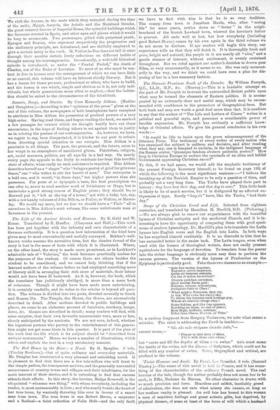Songs of the Christian Creed and Life. Selected from eighteen
centuries, and translated by Hamilton M. MacGill, D.D. (Pickering.) —Wo are always glad to renew our acquaintance with the beautiful hymns of Christian antiquity and the medimval Church, and it is in- teresting to have the opportunity of comparing them with good speci- mens of modern hymnology. Dr. MacGill's plan is to translate the Latin hymns into English verse and the English into Latin. In both ways he has acquitted himself creditably. It is no discredit to him that he has succeeded better in the easier task. The Latin tongue, even when used with the licence of theological writers, does not easily present equivalents for the language of devotion. To translate from the poorer into the richer language is obviously more easy than to perform the reverse process. The version of the hymns of Pradentins on the Epiphany is particularly good. Take these two stanzas as an example
late Manus, inquiunt, Regnator, astris imperans, Quern sic tremunt ccelestia, Cut lux et cetera inserviunt ?
Illustre quiddam cernimus, Quo! neselat Einem pat!: Sublime. column, interminum, Antiquius Ccelo et Chao:" "What mighty Potentate, they cry, Is this, Who rules the starry sky, To whom the heavens such homage pay, Whom all etherial things obey ?
Some hidden. god-like One appears, Knowing no cause, no end of years; Most High, Ineffable. sublime, Elder than Chaos, Heaven, or Time."
In a curious fragment from Gregory Nazianzen, we note what seems a mistake. The saint is addressing the Devil in iambics:—
" Teis rO3r OLZ7 thr01.61Y glath" cannot mean,—
" Plunge in that deep of thine. Fill it with thine own swine,"
but "enter and fill the depths of thine o vn swine." Beitir must moan the inside of the swine, not the ilAveeo; of Scripture, which could not be filled with any number of swine. Notes, biograplical and critical, are prefixed to the volume.


































 Previous page
Previous page